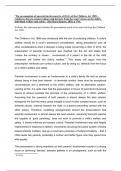‘The presumption of parental involvement in s1(2)(A) of the Children Act 1989…
reinforces the pro-contact culture and detracts from the court’s focus on the child’s
individual welfare and safety.’ (The Harm Report, 2020, p 174).
Evaluate this statement and whether the presumption needs to be removed from the Children
Act 1989.
The Children’s Act 1989 was introduced with the aim of protecting children. A child’s
welfare should be a court’s paramount consideration, taking precedence over all
other considerations when a decision is being made concerning a child. In 2014, the
presumption of parental involvement was inserted into the Act and states that
“unless the contrary is shown… involvement of a parent in the life of the child
concerned will further the child’s welfare.” 1 This essay will argue that this
presumption reinforces pro-contact culture, and by doing so, detracts from the focus
on a child’s welfare and safety.
Parental involvement is seen as fundamental to a child’s family life and as almost
always being in their best interest - to terminate contact, there must be exceptional
circumstances and a detriment to the child’s welfare, with no alternative solution.
Looking at this, it is quite clear that the presumption in favour of parental involvement
seems to almost overtake the principle of the paramountcy of a child’s welfare.
Assuming that the presence of both parents is almost always the best solution
disregards the fact that many cases brought to court involve complex issues, such as
domestic abuse, violence towards the child, or a parent preventing contact with the
other parent. Therefore, modelling arrangements around the presumptions that
parental involvement is almost always the best solution, assuming that both parents
are capable of ‘good parenting,’ does not work to promote a child’s welfare and
safety. It simply enforces pro-contact culture. Parental involvement was also largely
implemented in response to fathers’ movements accusing the justice system of being
biased towards mothers, and as a result also promotes of heteronormativity – that a
child needs two parents, preferably a mother and father figure who they spend time
with equally.
The presumption’s strong emphasis on both parents’ involvement results in a strong
focus on achieving ‘fairness’ between parents in an arrangement, such as with the
1
S.1(2)(a)
, amount of time spent with a child. More attention is paid to quantity than the quality
of this time, detracting from the focus on the child’s welfare and their best interest.
Another way s.2(1)(a) detracts from the focus on children’s welfare is seen
through the dismissal of children’s wishes not to maintain contact. S.1(3)(a) states
that a child’s wishes and feelings should be expressly considered, aligning with the
paramountcy principle. However, courts and professionals do not seem to truly
adhere to this. Children’s wishes are represented through professional reports, under
s.7 of the act. Unfortunately, if these do not fall in line with the professional’s opinion,
the child’s voice can be diluted, which is often justified by the child being ‘too young’,
‘immature’ or ‘manipulated by the other parent’ - dismissing their experiences. The
Ministry of Justice2 called this ‘selective listening’ - many children wanting contact
with their non-resident parents are listened to, whilst those who do not are ignored.
This completely clashes with the paramountcy of children’s welfare. Children can
have opinions they have thought about deeply and are more capable of making
decisions than courts seem to recognize. As mentioned in the Nuffield study of
Child’s Experiences in Private Law Proceedings [2021], children are actively involved
in their parents’ separation and are not simply passive observers. They expressed
wishes and opinions for a reason and dismissing their wish of no contact by claiming
that parental involvement is in their best interest can be more patronizing than
protective.
Of course, it must be acknowledged that a child’s wishes can be influenced by
a parent, and the presumption of parental contact can prevent the alienation of the
non-resident parent. Therefore, there is a difficult balance to be struck between
listening to a child and considering the possibility of outside influences on their wish,
or the possibility of them changing their mind. What is sure is that children’s wishes
must be valued, instead of being written off due to their age or different opinion.
The presumption of parent involvement clearly detracts from the paramountcy of
children’s welfare and safety in domestic abuse cases. Re L, V, M, H [2001], the
Court of Appeal issued guidelines regarding how courts should deal with domestic
abuse allegations, suggesting fact-finding hearings to inquire into whether an
allegation is true or not before coming to a decision regarding a child’s welfare. This
was developed into Practice Direction 12J. Unfortunately, the guidance issued by the
2
Report, Assessing Risk of Harm to Children and Parents in Private Law Children Act Cases (2020)




